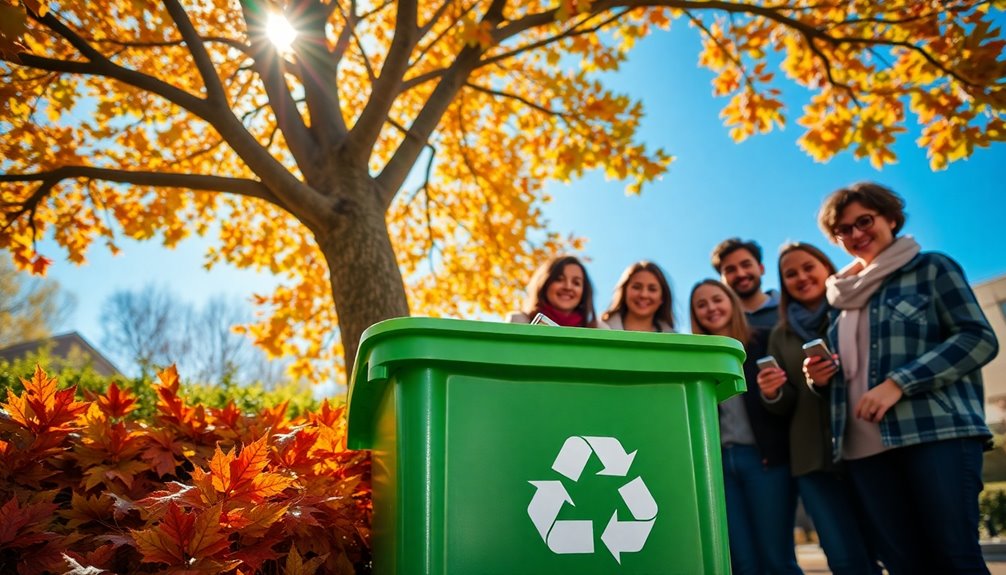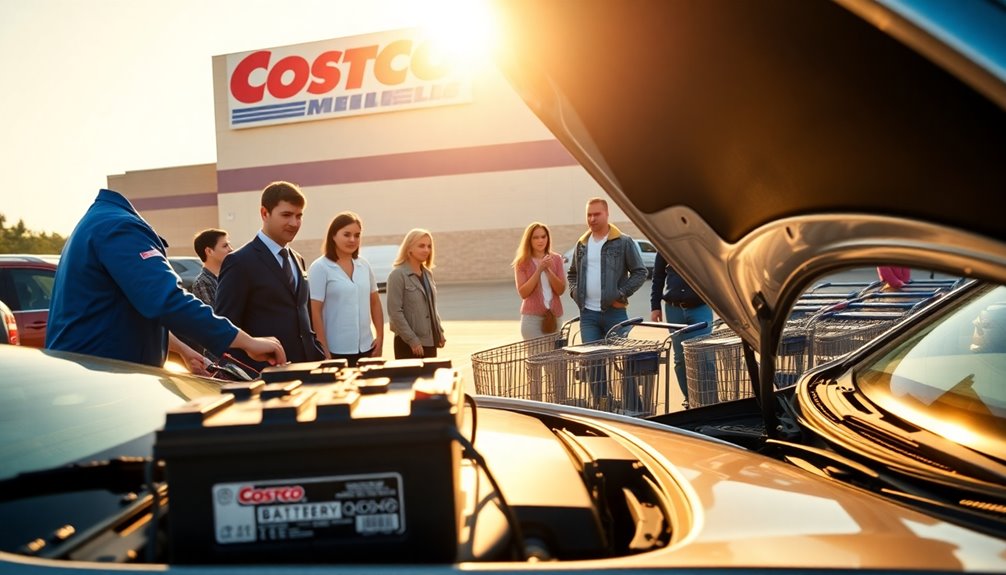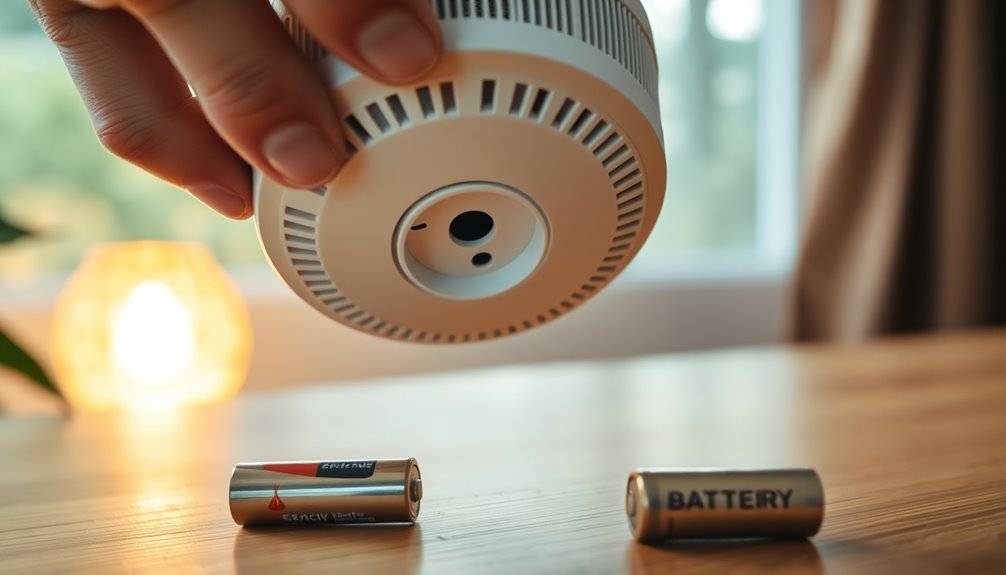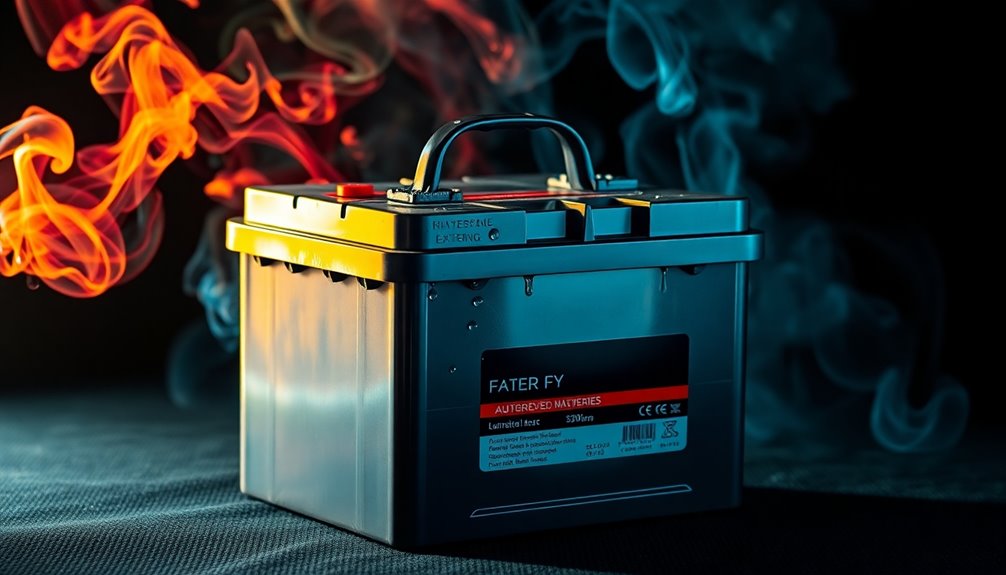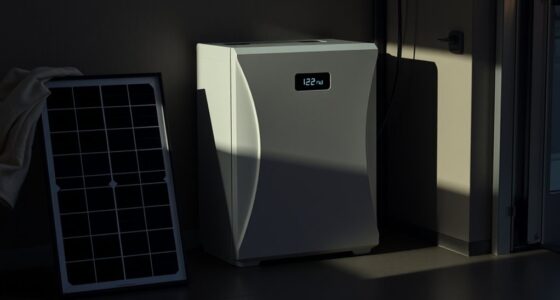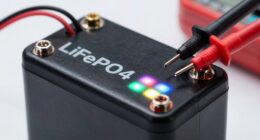You can safely dispose of batteries by visiting local recycling centers, auto parts stores, or retailers like Home Depot and Lowe's, which offer drop-off services for various battery types. For more specialized options, check with services like Fire Dawgs Junk Removal, who guarantee responsible battery collection and recycling. Additionally, you can use the Call2Recycle program to find drop-off points near you or even explore mail-in recycling options. It's crucial to recycle batteries to prevent hazardous waste from harming the environment. If you want to discover more convenient disposal solutions, keep exploring the options available!
Key Takeaways
- Locate local drop-off locations like Batteries Plus Bulbs and Clean Earth for safe battery recycling options.
- Check retailers like Home Depot and Lowe's for convenient battery drop-off programs.
- Utilize the Call2Recycle program to find nearby recycling points or mail-in options.
- Contact local recycling centers to confirm accepted battery types and proper disposal methods.
- Schedule battery disposal services with companies like Fire Dawgs Junk Removal for responsible collection and recycling.
Importance of Battery Recycling

When you consider the impact of your choices, it's clear that battery recycling plays an essential role in protecting our environment.
Batteries contain hazardous materials like lead and sulfuric acid, which can leak into the soil and water when you improperly dispose of them. By choosing to recycle your batteries, you greatly reduce the risk of these harmful substances entering ecosystems and contributing to environmental pollution.
In fact, over 90% of zinc-carbon batteries end up in landfills. Proper battery recycling can recover up to 96% of battery materials, minimizing the need for raw material extraction and conserving natural resources.
Your participation in battery recycling initiatives can improve community health and contribute to a more sustainable future for all.
Local Battery Drop-Off Locations
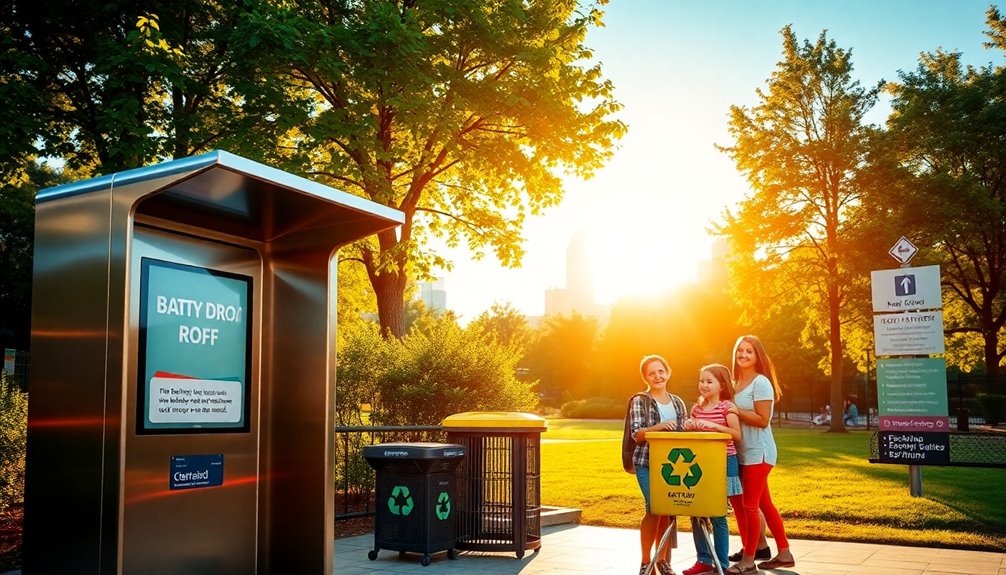
Finding a convenient place to recycle your batteries can make a significant difference in your community's environmental impact.
In Houston, there are several local options for battery drop-off:
- Auto Batteries Recycling Texas: 9700 Westpark Dr
- Batteries Plus Bulbs: 4765 FM 1960 Rd W Suite C
- Clean Earth: 9950 Chemical Rd, Pasadena, TX
These collection sites are great for safe battery disposal.
Don't forget to check each recycling center near you for specific battery types accepted to guarantee proper recycling practices are followed.
Fire Dawgs Junk Removal Services
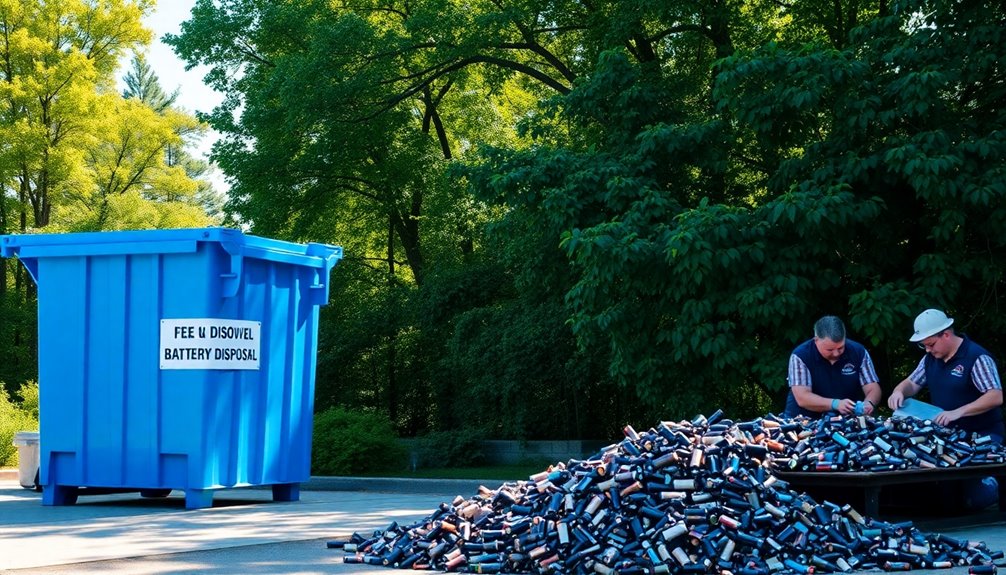
Fire Dawgs Junk Removal offers a convenient solution for disposing of old batteries, making it easier for you to keep your home or business clutter-free.
They specialize in the responsible collection of used batteries, ensuring they're recycled and not just tossed in the trash. While Fire Dawgs doesn't serve as a drop-off location, their residential and commercial services include battery disposal during cleanouts and pickups.
Committed to eco-friendly practices, they recycle or donate over 60% of collected items, including household hazardous waste.
You can easily schedule a service by contacting Fire Dawgs at 713-804-DAWG or visiting their website for more information. Enjoy a clutter-free space while contributing to a greener planet!
Types of Batteries for Recycling
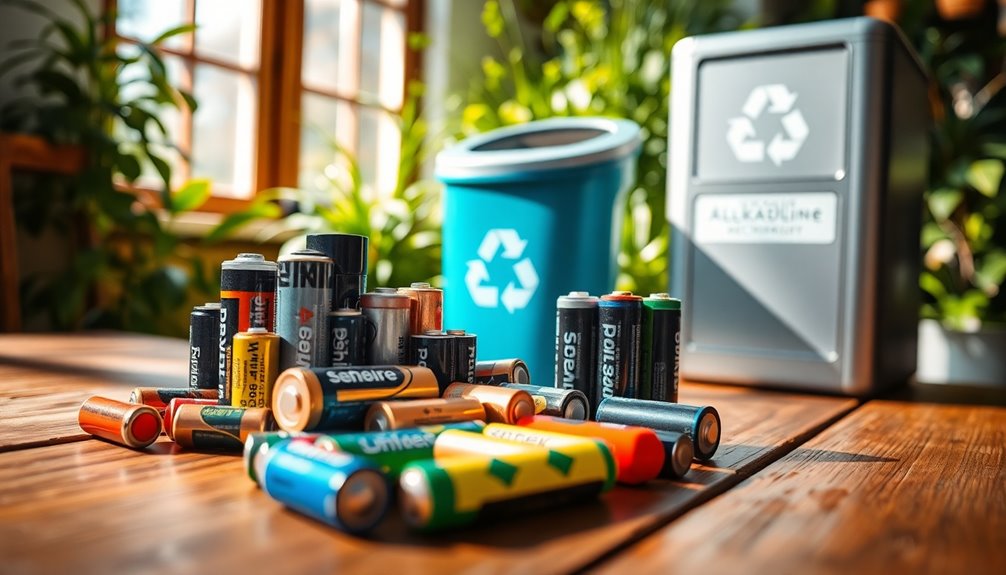
Batteries come in various types, each requiring specific recycling methods to guarantee safe disposal. Understanding these types can help you recycle effectively and avoid hazardous consequences.
- Alkaline and Zinc-Carbon Batteries: Generally safe for disposal in small quantities but should be recycled to protect the environment.
- Lithium-Ion Batteries: Found in devices like smartphones, these require special handling and must be recycled at designated facilities due to fire risks.
- Lead-Acid and Nickel-Cadmium Batteries: Both contain toxic materials and must be returned to retailers or recycling centers for proper disposal.
Rechargeable batteries are eco-friendly and can be reused many times, making their recycling essential.
Safe Storage Practices for Batteries
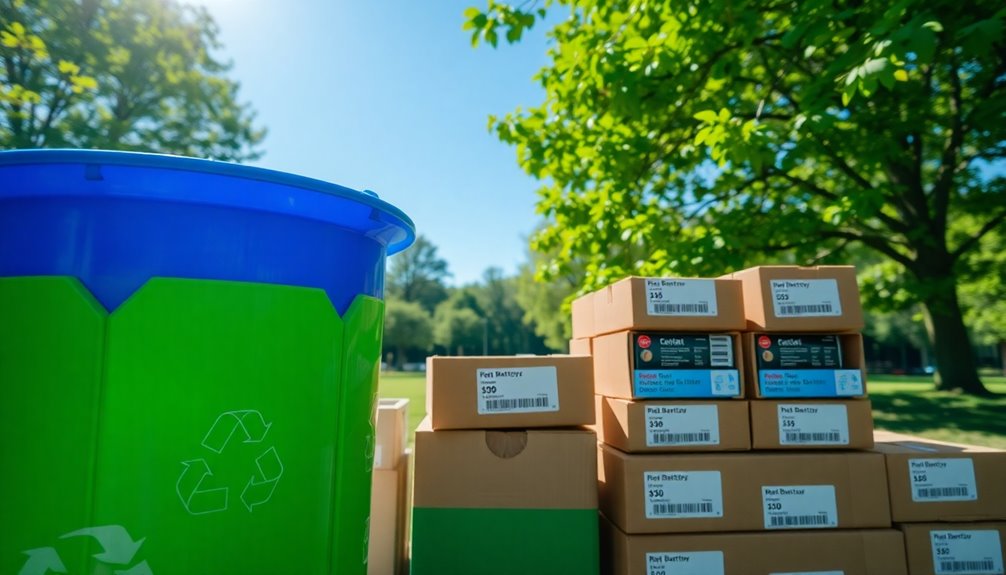
Properly recycling batteries is just the first step; safe storage practices are equally important to prevent accidents and extend battery life.
To store batteries safely, use a secure container that keeps terminals from coming into contact with each other. Line them up side-by-side to minimize the risk of electrical contact and maintain organization.
For 9-volt batteries, cover the positive and negative ends with tape to reduce the chance of current flow and accidental discharge. Keep your storage container away from metallic or conductive materials to further prevent accidental short-circuiting.
Finally, verify your batteries are stored in a cool, dry place, away from direct sunlight, as heat can cause them to leak or become damaged.
Risks of Improper Battery Disposal
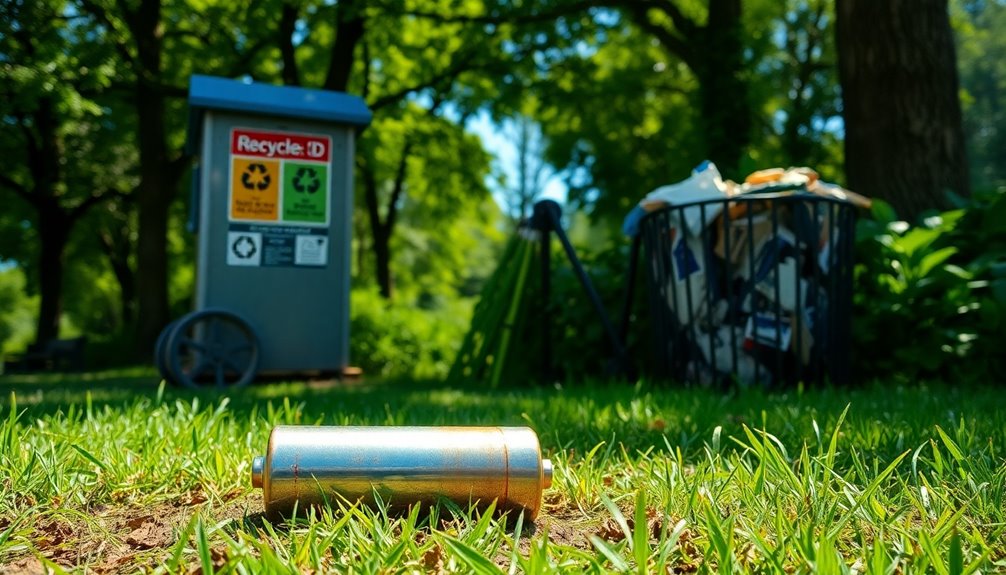
When you dispose of batteries improperly, you not only risk environmental damage but also pose serious health threats to your community.
Improper disposal can lead to the leakage of hazardous substances like lead and cadmium, severely impacting soil and water sources.
Here are some key risks to evaluate:
- Environmental Risks: An estimated 180,000 tons of battery waste is generated annually, contributing to landfill overflow and long-term ecological harm.
- Health Issues: Exposure to toxic materials can cause serious health issues, including neurological problems and respiratory diseases.
- Fire Hazards: Mishandling batteries, especially lithium-ion types, can ignite and create dangerous situations.
To protect both your environment and community health, prioritize recycling batteries instead of tossing them in the trash.
Battery Recycling Procedures and Regulations

To guarantee safe and responsible battery disposal, it is crucial to follow specific recycling procedures and regulations. Begin by identifying battery chemistry through labels to ascertain proper disposal methods. Wrap batteries in plastic and tape the terminals to minimize risks during transportation.
| Battery Type | Disposal Method | Local Resources |
|---|---|---|
| Lithium-ion | Recycle at local centers | Local recycling centers |
| Lead-acid | Recycle per federal laws | Permanent collection sites |
| Alkaline | Household hazardous waste | Collection events |
| Nickel-cadmium | Special recycling programs | Local recycling centers |
| Button cell | Store and recycle properly | Household hazardous waste |
Getting Involved in Battery Recycling
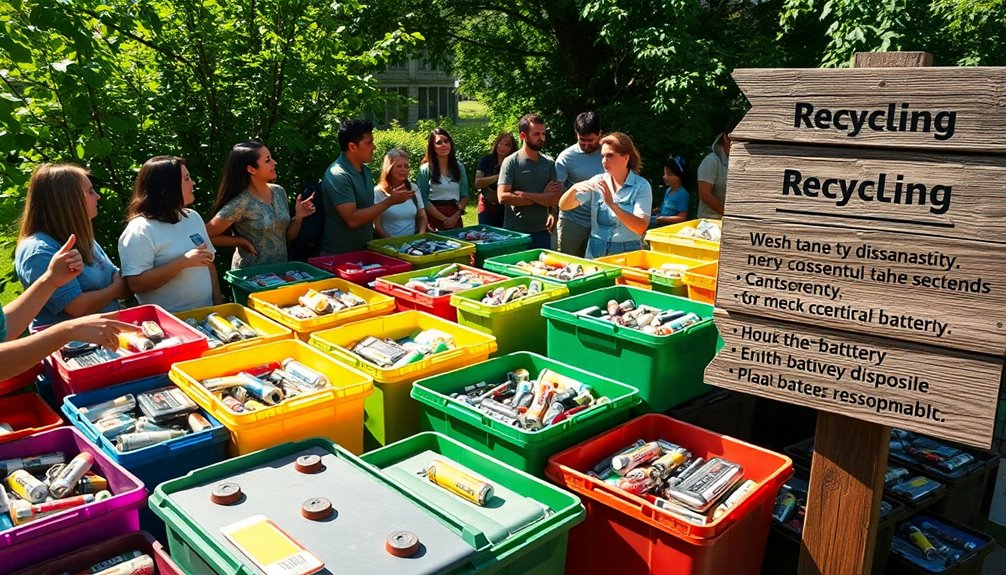
Getting involved in battery recycling is easier than you might think.
You can participate in community recycling events to safely dispose of your used batteries and connect with local resources that make recycling simple.
Community Recycling Events
As you consider ways to responsibly dispose of used batteries, participating in community recycling events can be a great option.
These events often provide a designated recycling location where you can safely drop off your batteries, keeping hazardous materials out of landfills.
Here are three reasons to get involved:
- Eco-Friendly Disposal: Many municipalities host household hazardous waste collection days specifically for batteries.
- Collective Impact: Recycling just five rechargeable batteries can greatly reduce landfill waste.
- Community Awareness: Local environmental organizations often collaborate to raise awareness and provide resources during these events.
Local Recycling Resources
Participating in community recycling events is just one way to manage battery disposal effectively. You can also tap into local recycling resources to safely dispose of used household batteries. Many retailers like Best Buy and Lowe's offer convenient recycling drop-off points for various battery types. By using platforms like Call2Recycle.org, you can locate these drop-off points near you, enhancing your environmental awareness and engagement.
| Resource | Description |
|---|---|
| Best Buy | Offers battery drop-off services |
| Lowe's | Accepts various battery types for recycling |
| Call2Recycle.org | Helps find nearby recycling locations |
| Battery Recycling Houston | Local initiative promoting battery recycling |
| Community Events | Collection events for safe battery disposal |
Resources for Disposal and Recycling

Wondering where to properly dispose of your used batteries? You've got several safe options for battery recycling that can help reduce waste. Consider these resources:
- Retailers: Stores like Best Buy, Lowe's, and Staples offer convenient drop-off programs for various battery types, including rechargeable ones.
- Local Recycling Centers: Check for nearby centers that accept batteries, ensuring proper disposal and recycling per local regulations.
- Call2Recycle: This program helps you locate drop-off points and provides mail-in options for easy recycling.
You can also find community events focused on battery disposal or visit RecycleNation.com and local government websites for more information on designated recycling facilities.
Don't let your batteries go to waste—recycle them responsibly!
Impact of Battery Recycling Statistics
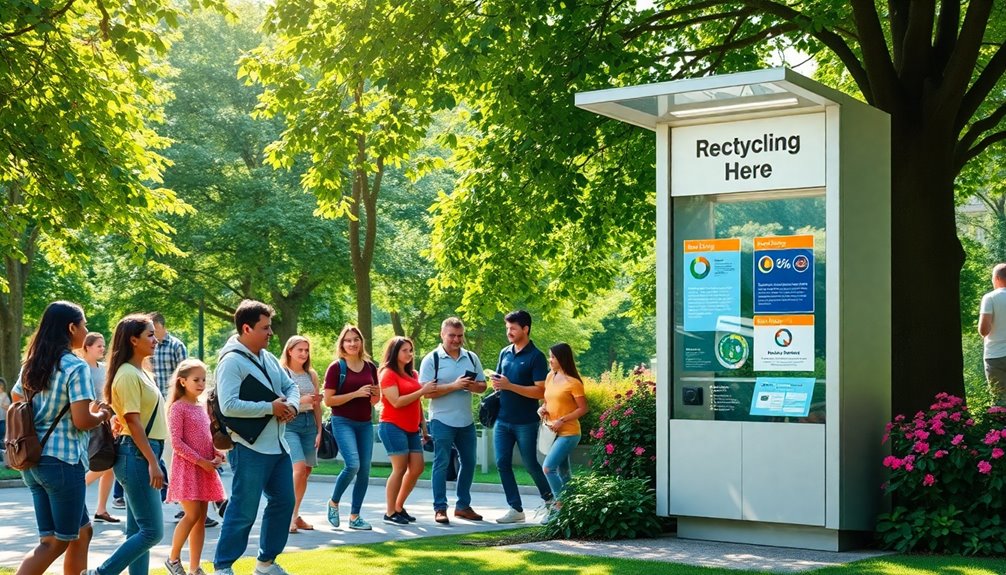
Battery recycling has an essential impact on both the environment and resource conservation. Did you know that improperly disposed batteries include lead batteries and can contribute to over 180,000 tons of waste annually? By recycling, you can help recover 25% to 96% of battery materials, which reduces hazardous waste.
Here's a quick look at the benefits of recycling:
| Statistic | Impact |
|---|---|
| 127 million pounds recycled | Prevents toxic waste in landfills |
| 90% energy saved in production | Promotes sustainability |
| 48 million batteries saved in TX | Community recycling potential |
Instead of throwing away your batteries, consider recycling them. Your efforts can greatly reduce the environmental impact and conserve essential resources.
Frequently Asked Questions
Where Is the Best Place to Dispose of Batteries?
When you're looking for the best place to dispose of batteries, start by checking if there are local recycling centers or retailers nearby.
Many stores, like Best Buy and Lowe's, have battery recycling programs.
Also, consider community events that focus on hazardous waste collection.
These options help guarantee batteries are disposed of safely, protecting the environment while giving you a convenient way to get rid of your old batteries responsibly.
Is It Bad to Throw Away AA Batteries?
Is it really worth risking the environment by throwing away AA batteries?
Disposing of them in the trash can harm ecosystems and water supplies, as they contain toxic materials like cadmium and lead. Many states don't allow this practice, treating batteries as hazardous waste.
By recycling them, you not only comply with regulations but also help recover valuable materials and save energy.
Proper disposal protects both the planet and public health—so choose wisely!
Does Autozone Take Old Batteries?
Yes, AutoZone does take old batteries! When you bring in your used automotive batteries, they'll recycle them responsibly.
Plus, you might even get a credit or discount on a new battery purchase as an incentive. It's a great way to guarantee you're disposing of your batteries safely while also saving a bit of money.
Just check with your local AutoZone to confirm their services and any additional battery types they accept.
How Do I Dispose of AA Batteries in WA?
To dispose of AA batteries in Washington, you've got a couple of options.
While they're generally non-hazardous and can go in the trash, recycling is a better choice for the environment.
Check out retailers like Best Buy or Home Depot; they often have battery recycling programs.
Also, keep an eye out for Household Hazardous Waste collection events in your area, where you can safely recycle various battery types, including AA batteries.
Conclusion
By recycling batteries, you're not just tossing away waste; you're planting seeds for a greener future. Each battery you properly dispose of is like a drop in a pond, creating ripples of positive change in your community. So, don't let those old batteries gather dust—seek out local drop-off spots and get involved. Together, we can turn the tide on pollution and spark a brighter, cleaner tomorrow for generations to come.

